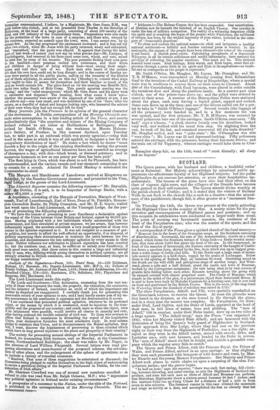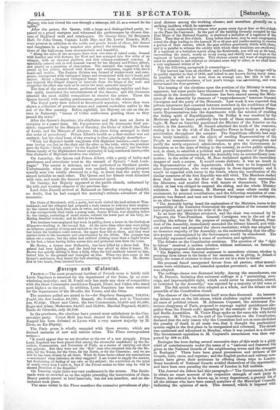SCOTLAND. The Queen passes, with her husband and children, a
healthful retire- ment at Balmoral. Her Majesty acknowledges by occasional public ap- pearances the affectionate loyalty of her Highland subjects; but the polite Highlanders do not canvass her attention, or press their hospitalities im- portunately. The lessons of the press have also had their effect on the class of vagrant sight-seers, and the villagers of the Deeside have become quite genteel in their self-restraint. The Queen attends divine worship at the parish-church of Crathie; and it is stated that the visiters of Balder Wells do not flock to the church like a mob to a theatre—that the attend- ance of the parishioners, though full, is often greater at a " sacrament Sun- day." On Thursday the 14th, the Queen was present at the yearly gathering of the Highland Clans in the country of Mar. A society exists for the pre- servation aud encouragement of Highland games and pastimes; and on this occasion its celebrations were conducted on a larger scale than usual. The point of meeting was Invercauld mansion, the residence of the head of the Farquharson clan; who was the master of the sports, and the host of the Royal party.
A correspondent of the Times gives a spirited sketch of the local scenery-
" Braemar lies in the heart of the Grampian range, at the Southern extremity of Aberdeenshire. Invercauld, the seat of the demonstration, stands on a rising ground, which forms the Southern terrace of Craig-heik—a finely-wooded moun- tain, that rises about 2,000 feet above the level of the sea. In the foreground, in front of the mansion of Invercauld, the Eastern extremity of the laughs of Castle- ton forms a spacious lawn, skirted by the Dee, from which rise up in rugged gran- deur a noble range of richly-clad hills. To the North-east a large mass of moun- tain scenery appears in a bold chain, topped by the peaks of Lochnagar. Below there is the opening of Balloch Buy, an immense fir-wood. Stretching round to the South are the wild cliffs and precipitous crags of another range; and West- ward, about a mile and a half distant, stand the castle and town of Braemar, backed by the Cairngorm mountains; the vale being shut in by vast screens of granite hills folding before each other, Benaure towering above the group with its summit covered with almost perpetual snow. The Castle of Braemar, which stands in the midst of the glen, is a picturesque object from Invercauld House. It is said to have been built by Malcolm Canmore for a hunting-seat, but is now held on lease and garrisoned by the British Crown. This is the scene of the stag-hunt in Waverley, where the standard of rebellion was raised in 1745."
The clans Farquharson, Atholl, and Fife, were specially marshalled on the Greenbank terrace, to receive the Queen. At noon the pibrochs were first heard in the distance, as the men wound in file through the glens; and in a short ,time the muster was complete. Mr. Farquharson, Sir Alex- ander Duff, Lord Ogilvie, and the Duke of Leeds, appeared at the head of their men, in full dress of tartan, hose and philabeg. The " men of .Atholl," 130 in number, under their Duke leader, drew up on two sides of a large square. " The Atholl troop," says the Times, " was organized in 1845, when her Majesty visited Blair Atholl; and are honoured with the distinction of being the Queen's body guard of Highlanders in Scotland. Their approach from Max Lodge, where they had met on the previous night on their way from the Highlands of Perthshire, was a fine sight; ar- rayed as they were in the Atholl tartan, armed with swords, dirks, and Lochaber axes, with new banners, and headed by the Duke in person. The men of Atholl' stand six feet in height, and include a grenadier com- pany which the regular army fails to match." The Queen and Prince Albert, with the Princess Royal, the Prince of Wales, and Prince Alfred, arrived in an open carriage: as they alighted, they were each presented with bouquets of wild flowers and roses, by Mas- ter Ricardo and the young Masters Farquharson. Her Majesty and Prince Albert took places in rustic chairs set upon a carpeting of the clan Far- quharson tartan ; and the games began.
"In half an hour," says the reporter, " there was such foot-racing, hill-climb- ing, hammer-throwing, and caber-tossing, as only the Highlands of Scotland can produce, and none but such men as those of Atholl and Braemar can perform. One Herculean Highlander threw a sixteen-pound hammer 90 feet 7 inches; and five stalwart Celts ran up Craig Clunie for a distance of half a mile in from seven to nine minutes. The foremost runner in this race climbed the mountain and crags as nimbly as a deer, and accomplished the feat so cleverly that her
Majesty, who had viewed the race through a telescope, left 5/. as a reward for his agility."
After the games, the Queen, with a large and distinguished party, re- paired to a grand marquee and witnessed the performance by chosen dan- cers of Highland reels and strathspeys. Sir George Grey, Sir Benjamin Hall, Sir John Guest, Captain Leith Hay, and Mr. Lewis Ricardo, M.P., were present in addition to the noble and gentle heads of clans, fair dames and daughters in a large number also graced the meeting. The decora- tions of the ball-room were characteristic and beautiful.
" Along the sides of the marquee there were two tiers of raised seats, dressed with heather and wild flowers; the West end was arranged into five sides of an octagon, with an elevated platform and rich crimson-cushioned couches. A splendidly covered sofa in rich damask was set for her Majesty and Prince Albert, and placed on a carpeting of clan-tartan. The marquee was supported in the centre by five pillars, dressed with flowers and evergreens, topped with deer's heads and antlers. The Eastern division was formed of wicker-work and ever- greens, interspersed with variegated lamps and ornamented with deer's beads and antlers. About a thousand variegated lamps were hung in rustic chandeliers, and disposed like fringed drapery at intervals from the wings of the roof: and altogether the effect was such as to excite the most agreeable surprise."
The feat of the sword-dance, performed with exciting rapidity and fear- less spirit, concluded the entertainment of the dances; and the clansmen selected the most skilful competitors to receive the prizes. These the Queen herself, with smiling graciousness, presented to the winners.
The Royal party then retired to Invercauld mansion; where they were shown a collection of precious stones and natural curiosities native to the soil of the Mar country. Before nightfall, her Majesty set out on the re- turn to Balmoral; "bursts of Celtic enthusiasm greeting them as they passed the lawn."
After the Queen's departure, the chieftains and their men sat down in company to a grand feast. Mr. Farquharson and Sir Alexander Duff pre- sided; supported by the Marquis of Huntley, the Duke of Atholl, the Duke of Leeds, and the Marquis of Aboyne; the clans being arranged in their due order of precedency. Prince Albert's health as a deer-stalker was not omitted; but the chief toast of the evening is thus glowingly described—
"When her Majesty's health wasdrunk with Highland honours,—each clans- man having one foot on the chair and the other on the table, while the president gave the Gaelic Neish, neish I' for the English Hip, hip, hurrah!' and the bois- terous loyalty of the Highlanders found expression in long-continued cheers,—the true character of Highland devotion was realized."
On Saturday, the Queen and Prince Albert, with a party of ladies and gentlemen and attendants went to the summit of Byron's " dark Loch- nagar." The ascent is toilsome, and was performed on Shetland ponies. Unfortunately, when the summit was reached, the magnificent prospect usually seen was totally obscured by a fog, so dense that the party were almost invisible to each other. The Queen and her friends were drenched With rain, and made the descent with unwonted speed.
On Sunday, her Majesty appeared at the parish church, unharmed by the toils and weather chances of the previous day.
Lord John Russell arrived at Balmoral on Saturday evening; thankful, no doubt, that he had escaped the morning's arduous adventure of the mountain.
The Duke of Bucelench, with a party, last week visited his lead-mines at Wan- lockheed; and the villagers had prepared a rude cannon to welcome their employ- er: the cannon had been fired once or twice, and was again loaded; by some means it was unexpectedly fired while a young man, James M`Call, was standing before it: the charge, consisting of small stones, entered the lower part of his body, in- flicting dreadful wounds; and he died in two hours.
Two brothers were employed last week in pulling down a house in the Gorbals at Glasgow—working in the second flat. At the same time other men were piling an immense quantity of stone and rubbish on the floor above. A crack was heard; but before the brothers could retreat, the upper floor fell on them, and they were carried down to the basement and overwhelmed by the debris. The younger was taken out a corpse; but the other had suffered nothing more than a slight bruise on his foot, a beam having fallen across him and protected him from the ruins.
Mr. Brown, a farmer near Dalbeattie, has been killed by a fierce ball. The animal had been fighting, and the herd-boy was afraid to drive it home; Mr. Brown was quietly driving it from a field, when the bull suddenly turned on him, butted him to the ground and trampled on him. When two men came to the farmer's assistance, they found the bull standing quietly beside him. Mr. Brown died in two hours, from internal hurts.



























 Previous page
Previous page